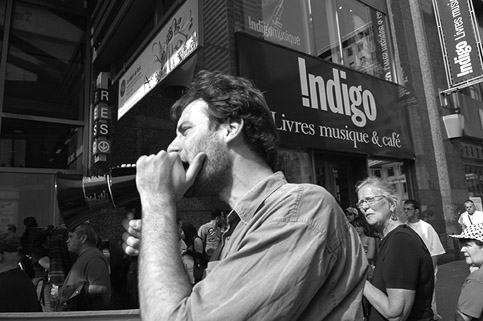Picketers boycott Indigo-Israel connection
- The Link. Concordia University: By Nadia Hausfather & Sarah Hoida

- Photo: Darren Ell. Protesting outside of Indigo in Montreal.
Picketers outside Indigo’s downtown bookstore last Saturday urged shoppers not to enter because the Chapters-Indigo’s CEO heads a foundation that supports foreign soldiers who fight in the Israeli army.
The demonstration was set to coincide with the 20th anniversary of massacres that took place at the Sabra and Chatila Palestinian refugee camps in Lebanon.
“We want CEOs to publicly renounce their ties to the Israeli military,” said Stefan Christoff. He is a member of Tadamon, a social justice collective which coordinates the pickets outside the downtown Indigo on Ste-Catherine every other Saturday in collaboration with the Coalition Against Israeli Apartheid.
Reisman is the co-founder of a scholarship program that supports mostly foreign soldiers without immediate family in Israel—so-called “lone soldiers” who have completed service in the Israel Defense Forces. There are approximately 5,000 lone soldiers serving in the IDF at any given time.
The foundation, called HESEG—a Hebrew word meaning achievement—was established in 2005 “to reward the soldiers in a small way for what they gave to the state of Israel,” according to the HESEG website.
Scholarships for soldiers don’t equate to supporting the Israeli army, said Moshe Romen, managing director of HESEG Foundation.
“HESEG does not contribute to the recruitment or the support of the army in any way,” he said. According to Romen, HESEG is an expression of Reisman’s philanthropic commitment to education and achievement. For example, Romen said, Reisman also supports medical conferences between Arab, Israeli and Canadian doctors. He said she has also been involved in building libraries and creating university exchange programs.
Ehab Lotayef from CAIA said that the HESEG website promotes fighting over education.
“From the moment you get to the home page, there are soldiers running and military action,” said Lotayef. “They are indirectly supporting this recruitment.”
“It’s not morally acceptable for a Canadian company to financially support soldiers of a country occupying a people,” said Christoff. He said that the boycott is a symbol and part of a larger movement to expose government complicity with Israel. “Our government is one of strongest supporters of Israeli policy,” he said. “We have a direct responsibility to address this issue in Canada.”
The Montreal pickets are part of a broad campaign initiated in July 2005 by Palestinian civil society calling on the international community to impose boycotts against Israel similar to those applied to South Africa in the apartheid era, explained Christoff.
Leemor Chandally is a former lone soldier. She served with the Israeli army from 2004 to 2005 as a non-commissioned officer for the Israeli Foreign Affairs department. She said that lone soldiers include those volunteers who “want to be combat soldiers and fight for the state of Israel.” But they also include people who do administrative work and simply want to help.
“I could understand the boycott,” she said, “but at the same time, when you look at it from the perspective of somebody living [in Israel] or someone who does decide to come, many simply want to contribute to Israel in some way, do something good or have a good experience.”
Romen said the picketing groups are focusing their energies in the wrong direction instead of doing something constructive to help Palestinians and Israelis get along.
According to Christoff, the purpose of the pickets is “to direct the protest for something constructive and give people the ability to take an active role on it.”
“Montrealers shop there and they have the right to know,” he said.


